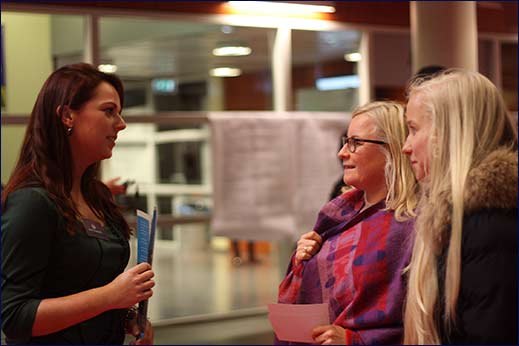Dutch are Some of the Best English Speakers in Europe - Wittenborg Steps up Support for Non-Native Speakers
 After Sweden, the Dutch boast the highest level of English proficiency in Europe among non-native speakers of the language. This is according to the Education First English Proficiency Index (EP EPI) for 2015.
After Sweden, the Dutch boast the highest level of English proficiency in Europe among non-native speakers of the language. This is according to the Education First English Proficiency Index (EP EPI) for 2015.
“In 2015, English is widely accepted as the primary international language, and it is increasingly defined as a basic skill required of every student in every education system,” the report’s executive summary reads. A total of 70 countries were surveyed. EF EPI was launched in 2011.
Since this year, WUAS has stepped up its language support for non-native speakers with free English lessons. Wittenborg’s Chair of the Executive Board, Peter Birdsall, said at the start of the semester: “We don’t feel the English Language Testing System (IELTS) requirement is sufficient, which is why we offer free English lessons at Wittenborg for those students who need additional support.”
Since this year, WUAS has stepped up its language support for non-native speakers with free English lessons. Wittenborg’s Chair of the Executive Board, Peter Birdsall, said at the start of the semester: “We don’t feel the English Language Testing System (IELTS) requirement is sufficient, which is why we offer free English lessons at Wittenborg for those students who need additional support.”
The EF EPI 2015 report continues: “In developing countries, English is often tied to development goals, expansion of the service sector, and increased connectivity to the rest of the world.” The top 5 countries are: Sweden, the Netherlands, Denmark, Norway and Finland. Libya scored the lowest, followed by Cambodia and Saudi Arabia.
Of the top 5 countries, the Dutch government spends the least of its total budget on education (11.9%), the average number of years of education received by people aged 25 and older in Holland is 11.9 years and 94% of the country’s inhabitants has internet access.
The report also reveals that Europe has the strongest English proficiency of any region in the world and notes that the EU explicitly promotes “plurilingualism and intercultural education” in all member countries.
However, it warns that much more will need to change before English can fulfil its potential to connect people to each other, spread information, and facilitate exchange. “We believe the most essential shift needed is towards communicative teaching practices. In far too many countries, both rich and poor, English is still taught with little regard to its practical use. Until all English teachers are teaching English as a tool for communication, countries and individuals will not enjoy the full benefit of a global language.”
Highlights of the report include:
- Adults in Northern Europe have exceptionally good English skills compared to other non-native English speakers. However, there is still room for growth in Northern Europe. Although conversational English is widespread and daily exposure common, many students do not develop an adequate level of academic English to pursue tertiary studies in the language. Several countries have recently undertaken reforms to counteract this “ceiling effect”.
- European women have higher proficiency levels than European men.
- France, Italy, and Spain—three of the four largest non-English-speaking countries in Europe —are behind European Union averages. While Italy and Spain have both shown some improvements over the past eight years, France remains weak. In fact, France is so far behind its neighbours that its English proficiency levels are akin to those of countries on the eastern edges of Europe. Whether due to a cultural aversion to English or an inability to reform its education system, France is on a different trajectory from its neighbours.
Source: Education First
WUP 10/11/2015
by Anesca Smith
©WUAS Press